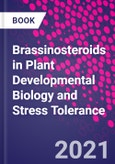Brassinosteroids�in Plant Developmental Biology and Stress Tolerance�provides insights into understanding the mechanisms of�Brassinosteroid-regulated plant developmental biology and stress tolerance covering various biochemical, physiological,�genetic�and molecular studies.��
�As unprecedented climate change poses a serious threat to global food security by intensifying environmental stresses, studies reveal that�Brassinosteroids�(BRs) could not only protect plants from stresses to ensure food security, but could also reduce toxic compounds in edible plant parts for assuring food safety. Therefore, utilization of BRs in modern agriculture will be of great significance in the context of global climate change.��
�This book also highlights key information for developing eco-friendly growth regulators and understanding the importance of�brassinosteroids�in safe food production.�
Please Note: This is an On Demand product, delivery may take up to 11 working days after payment has been received.
Table of Contents
1. An introduction to brassinosteroids: History, biosynthesis and chemical diversity
2. Revisiting brassinosteroids signaling in plants: current advances and challenges
3. Brassinosteroids in shaping plant architecture
4. Regulation of photosynthesis by brassinosteroids
5. Role of brassinosteroids in reproductive growth and development in plants
6. Crosstalk between brassinosteroids and other signals: biological functions and molecular mechanism
7. Convergence of brassinosteroids and environmental signals
8. Brassinosteroids in plant response to high temperature stress
9. Role of brassinosteroids in cold tolerance
10. Plant responses to water stress: role of brassinosteroids
11. Brassinosteroids in pesticide metabolism and heavy metal tolerance
12. Involvement of brassinosteroids in plant response to elevated carbon dioxide
13. Regulation of plant defense against biotic stressors by brassinosteroids
14. Application of brassinosteroids for improving crop production: From laboratory to field
Authors
Golam Jalal Ahammed Associate Professor, Department of Horticulture, College of Horticulture and Plant Protection, Henan University of Science and Technology, Luoyang, Henan, China. Dr. Golam Jalal Ahammed is an Associate Professor at the Department of Horticulture, College of Horticulture and Plant Protection, Henan University of Science and Technology, Luoyang, China His major research interests include plant stress physiology, phytohormones, climate change effect on plants, and environmental pollution.? Dr. Ahammed was awarded two research grants for International Young Scientists by the National Natural Science Foundation of China. He was also a recipient of several grants from China Postdoctoral Science Foundation. Currently, Dr. Ahammed is actively involved in unraveling the role of melatonin in plant stress response and is a Senior Editorial Board Member of Scientific Reports (Springer Nature), and an Associate Editor of AoB Plants (Oxford Academics), and Journal of Plant Growth Regulation (Springer). Anket Sharma Visiting Research Scientist, University of Maryland, College Park, USA and Associate Professor (Adjunct), Zhejiang A & F University, Hangzhou, China. Anket Sharma is currently working as a Visiting Research Scientist at University of Maryland, College Park, USA & as an Associate Professor (Adjunct) at Zhejiang A & F University, Hangzhou, China. Dr. Sharma has more than 100 research articles to his credit. Dr. Sharma Completed his M.Phil and Ph.D. from Guru Nanak Dev University, Amritsar, Punjab, India. Jingquan Yu Professor, Department of Horticulture, Zhejiang University, Hangzhou, ChinaDirector, Key Laboratory of Horticultural Plants Growth, Development and Quality Improvement, Ministry of Agriculture, China. Prof. Yu is Director, Key Laboratory of Horticultural Plants Growth, Development and Quality Improvement, the Ministry of Agriculture, China Professor,?Department of Horticulture, Zhejiang University. He is?? one of the leading scientists in the area of brassinosteroid research and has received a number of honors and awards such as Excellent Youth Instructor (2007), Yangtze River Scholar (2007), National Natural Science Award (2006), Science and Technology Advancement Award (2006), Science and Technology Advancement Award of Zhejiang Province (first class, 2005), National Outstanding Youth Scholar (2002), and so on. He has published more than 200 research articles in peer-reviewed journals, and is an Editorial Board Member of Scientific Reports, Plant Biology Section and Associate Editor of Frontiers in Plant Science.








